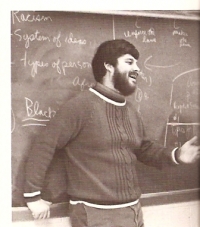![]()
My ninth grade social studies teacher, Gerry Eggen, was a fierce liberal in his late 20s. He had a strong passion for teaching and waking up junior high school minds. Even conservative classmates — among those few peers who hitherto had thought about politics enough to place themselves somewhere on the political spectrum — said that though they didn’t generally agree with him, he “made you think.” Per my first book dedication to his memory: “Mr. Eggen taught us the difference between The New Republic and the National Review, and why we should care.
Eggen encouraged us to invite political and social issue activists from the Greater Detroit area into our classroom to speak. These speakers ranged in political temperament from far right to center to far left. Students were assigned to contact personalities, convince them to come, and handle all the scheduling and logistics. Not only were we learning about the important issues of the day, we were gaining valuable “adulting” experience like making business telephone calls and completing meeting arrangements.
Upon receiving suggestions for speakers and topics if necessary, students began setting up talks. We had visits from representatives of the Vietnam Veterans Against the War, Jehovah’s Witnesses, Detroit Public Schools, NAACP, John Birch Society, New Detroit committee, George Wallace 1968 presidential campaign, Detroit Bar Association, Young Republicans, and CORE, aka Congress of Racial Equality.
Our ninth grade class under the leadership of Mr. Eggen became a bit of a legend at all-white Fuhrmann Junior High School, situated in a Macomb County second-tier Detroit suburb. Word got around. Teachers and students from other classes began attending many of our speaker presentations, sometimes to the point of the classroom overflowing.
Donald Lobsinger
One provocateur we invited was a rabid anti-communist named Donald Lobsinger who had formed a group called Breakthrough in 1963. Breakthrough apparently picked up where Sen. Joseph McCarthy’s (R-Wis.) communist subversion conspiracy theories campaign left off.
“Lobsinger has been a mainstay of reactionary conservatism in Michigan for years. In the 1960s he started Breakthrough, a pro-Vietnam War, anti-civil rights group that wasn’t exactly shy about its staunch opposition to all-things lefty. …
“In March 1966, a Detroit Free Press article had this to say about Breakthrough’s actions at a peace march in Detroit: ‘Breakthrough invaded the ranks [of peace marchers], pushing, shoving, and even using hat pins to provoke. One Breakthrough member was wearing a little pin on his shirt, and a marcher tore it off. It was a tiny swastika.’”
(“White-in Candidate”; Detroit Metro Times; 7/5/2006.)
Mr. Lobsinger also made headlines during the first years of the New Detroit committee, formed in the aftermath of the 1967 Detroit Riot to find solutions to racial tension:
“White groups like ‘Breakthrough,’ started by city employee Donald Lobsinger, a Parks and Recreation Department employee, wanted to arm whites and keep them in the city because if Detroit ‘became black’ there would be ‘guerrilla warfare in the suburbs.’”
(Fine, Sydney; Violence in the Model City: The Cavanagh Administration, Race Relations, and the Detroit Riot of 1967; 1989.)
When we had him speak at Fuhrmann Jr. High in 1968, Lobsinger was in his prime. He probably was the incendiary highlight of the school year. Students and teachers were lined up down the hall trying to hear his pitch. Mr. Eggen normally didn’t inject himself into speakers’ presentations but this one was different. My lasting memory of that day was the anti-communist, protector-of-white-rights Donald Lobsinger and the flaming liberal Gerald Eggen sarcastically wrapping up the event after squaring off during the Q&A exchange at the end of the talk:
[DONALD LOBSINGER:] “But I’m not calling you a communist” (said in the way the speaker really believes you’re a communist).
[MR. EGGEN:] (smiles) “Well I’m not calling you a fascist” (said in the way the speaker really believes you’re a fascist).
Thinking Statements
Yes, Mr. Eggen woke up sleeping adolescent minds. Our final grade depended largely upon a school-yearlong assignment to write a paragraph on our thoughts about each of a large collection of lofty sounding “Thinking Statements.” Here are some examples:
“I may disagree with what you say, but I will defend to the death your right to say it.”
“Never get lost in the crowd.”
“All men are created equal.”
“Sneering at one’s ‘inferiors’ gives them an immediate superiority over you.”
“Most people believe what it pays to believe, and hardly anyone will accept an idea that jeopardizes his security or threatens her self-esteem.”
I was able to come up with a decent paragraph for all the thinking statements except one:
“Man’s inhumanity to man.”
For whatever reason, I hadn’t yet heard this phrase nor had any exposure to its philosophical underpinnings.
While hanging out after class one day, Mr. Eggen asked a few of us if we were having trouble with any of the statements. I mentioned the one I was stuck on: “Man’s inhumanity to man.” One of my friends, Nick O., spouted off, “What!? That one’s easy!” He proceeded (condescendingly) to give me numerous examples of how humankind has mistreated its own members, such as the history of wars throughout civilization (just and unjust), slavery, the Holocaust, and so on.
OK, I finally got it (and wrote a heck of a paragraph). How could I be so thick? On the other hand, why aren’t today’s ninth graders writing paragraphs about thinking statements? At least I learned about “man’s inhumanity to man” by my last year in junior high.
Man’s Inhumanity to Man
We should rework this statement to read, “Humankind’s inhumanity to humankind.” Granted, it doesn’t roll off the tongue with the same ring as the old version. But equality and progress must march forward, helped along by congresspersons, chairpersons, servers, and mail carriers.■





Leave a Reply